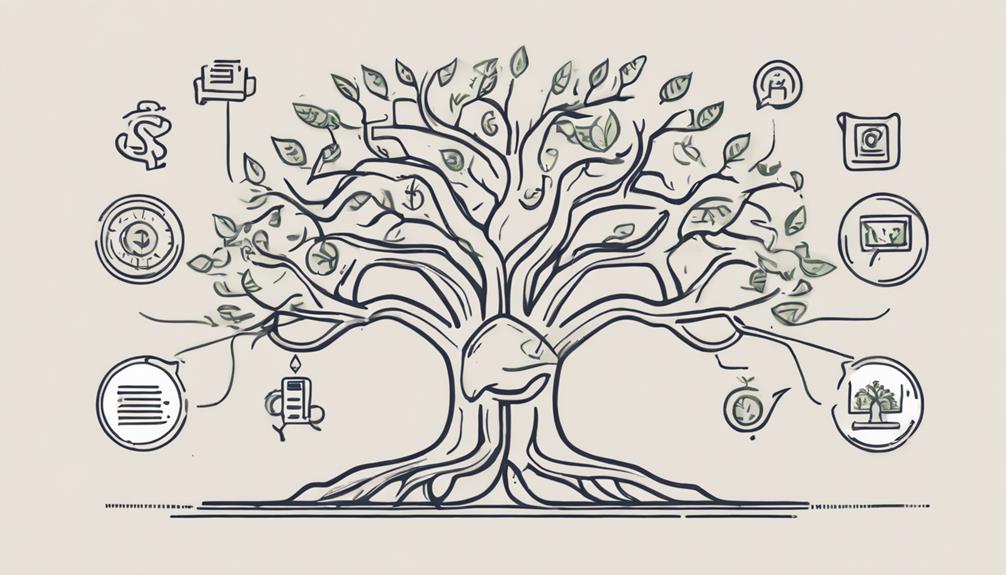Ready to level up your self-improvement game? Start by honing your emotional intelligence – it's your key to success. Set goals, journal for clarity, seek feedback, and practice mindfulness. Next, prioritize your physical and mental health. Consistent exercise, stress-reduction, adequate sleep, and good nutrition are your best friends. Don't forget about those social skills! Master conflict resolution, show empathy, network wisely, and watch your career prospects soar. And hey, in the professional domain, always be on the lookout to grow. Identify areas for improvement, grab certifications, and never stop learning. Financially savvy? Budget, save, invest wisely – your future self will thank you. Ready for more growth tips?
Key Takeaways
- Evaluate current skills and knowledge for growth areas.
- Seek new certifications or training for industry relevance.
- Continuous learning enhances professional skill set.
- Mentorship offers guidance for career development.
- Professional growth courses demonstrate commitment to improvement.
Emotional Intelligence and Self-awareness
How can you enhance your personal growth through emotional intelligence and self-awareness?
Emotional intelligence plays a significant role in your success, contributing to 58% of it. By developing self-awareness, you can set goals that help you respond to stress effectively, rather than reacting impulsively.
One way to cultivate self-awareness is through journaling, which allows for reflection and a more objective view of yourself. Seeking feedback from others and practicing mindfulness are also effective strategies to boost your emotional intelligence.
Additionally, working on empathy, self-regulation, and social skills are essential components of emotional intelligence and self-awareness. By honing these skills, you can navigate social situations more effectively and manage your emotions better.
Physical and Mental Health

To maintain peak physical and mental health, it's essential to prioritize consistent exercise routines and seek professional help when needed.
Physical health is closely linked to mental well-being, so ensuring you take care of your body is vital. Incorporating stress-reduction techniques like meditation and yoga can greatly improve your psychological well-being.
Additionally, getting adequate sleep, maintaining a balanced diet, and engaging in regular exercise all play significant roles in enhancing your overall health.
Remember, it's okay to reach out for professional help when necessary; mental health professionals can provide valuable support and guidance.
Social Skills and Networking

Enhancing your communication skills is key to establishing and nurturing strong personal and professional relationships.
To bolster your social skills and networking abilities, consider the following tips:
- Learn Conflict Resolution: Master techniques to navigate challenging situations effectively.
- Develop Empathy: Understanding others' perspectives fosters empathy and builds stronger connections.
- Join Clubs or Groups: Practice social skills in a supportive environment and expand your network.
- Unlock Career Opportunities: Improving social skills can lead to better career prospects and personal growth.
Professional Development

Identify growth areas in your profession by evaluating your current skills and knowledge gaps. Professional development is essential for staying competitive in today's fast-paced work environment.
Consider acquiring new certifications or enrolling in training programs to guarantee industry relevance. By continuously learning and adapting to new technologies and tools, you can enhance your professional skill set and open doors for career advancement.
Don't underestimate the value of mentorship opportunities; seek guidance and support from experienced professionals to navigate your career development effectively. Participating in professional growth courses not only boosts your skills but also showcases your commitment to personal improvement.
Personal Finance Management

Effective personal finance management guarantees long-term financial stability and peace of mind through strategic budgeting and wise investments.
When it comes to managing your money, there are key practices to keep in mind:
- Budgeting: Creating a budget and sticking to it's fundamental for effective money management.
- Saving: Setting aside a portion of your income regularly helps build a financial safety net for the future.
- Investing: Making informed investment decisions can help your money grow over time.
- Financial Literacy: Educating yourself about finances empowers you to make smart money choices.
- Long-Term Stability: Consistent budgeting and saving practices pave the way for a secure financial future.
Frequently Asked Questions
How Do I Write a Growth Idea for Myself?
You write a growth idea for yourself by setting specific, achievable goals aligned with your aspirations and values. Reflect on strengths, weaknesses, and seek guidance to refine your plan. Create a detailed roadmap to track progress effectively.
How Do You Track Self Improvement?
To track self-improvement, you can use journals or apps to measure progress in key areas like meditation or skills learned. Reflect on your growth regularly and seek feedback for insights. Stay motivated on your journey!
Have You Identified Any Areas of Self Development?
You've pinpointed areas for self-development by reflecting on strengths and weaknesses. Setting clear goals aligned with your aspirations is key. Focus on emotional intelligence, physical health, communication, and professional growth. Regular self-assessment and feedback drive progress.
How Do I Write a Self Growth Plan?
To write a self growth plan, start by reflecting on your dreams and goals. Assess strengths, weaknesses, and set specific objectives. Seek guidance, create a detailed roadmap with milestones, and adapt it regularly for sustained progress.
How Can Growth Mapping Help Me Implement Growth Hacks for Self-Improvement?
Growth mapping can provide a clear path for implementing effective growth hacks to achieve self-improvement. By strategically planning your personal development journey, you can identify opportunities for growth and utilize practical selfimprovement tips to make tangible progress towards your goals.
How Can Growth Mapping be Applied to the Hotel Development Industry?
Growth mapping can be applied to the hotel development industry by identifying key areas for expansion and improvement. By utilizing a cuttingedge hotel development program, industry professionals can pinpoint profitable locations, analyze market trends, and optimize strategic planning for future projects. This innovative approach can lead to sustained growth and success in the hospitality sector.
How Can Growth Mapping Help in Achieving Self-Improvement Goals?
Growth mapping is essential for the significance of selfgrowth. By creating a visual representation of your self-improvement goals, you can track progress, identify areas for development, and stay motivated. Having a clear roadmap allows you to set realistic targets and take proactive steps towards personal growth.
Conclusion
In the journey of self-improvement, growth mapping serves as your trusty compass, guiding you towards areas of potential development.
By honing your emotional intelligence, taking care of your physical and mental well-being, enhancing social skills, advancing professionally, and mastering personal finance management, you're paving the way for a brighter future.
Remember, Rome wasn't built in a day, but with dedication and a strategic plan in hand, you're well on your way to reaching your full potential.
Happy mapping!









